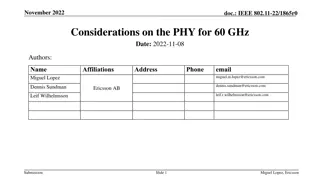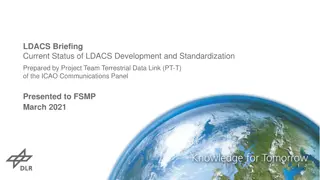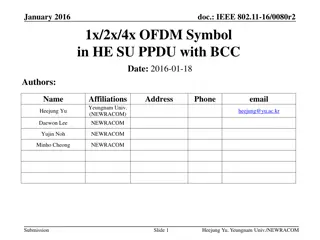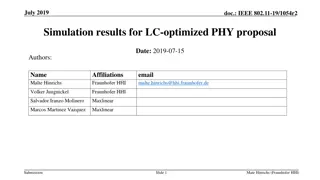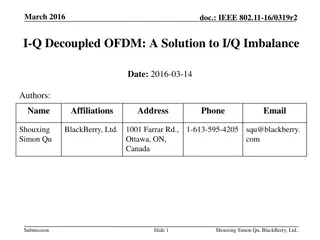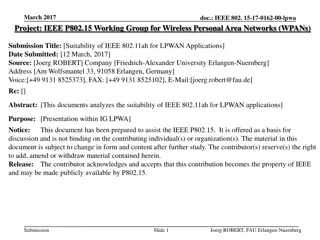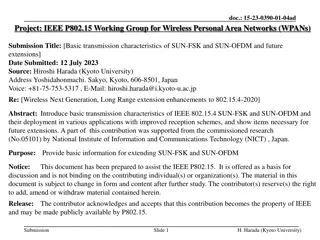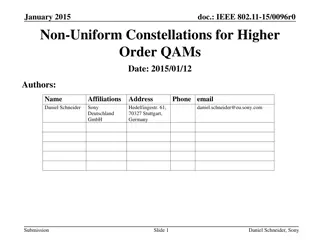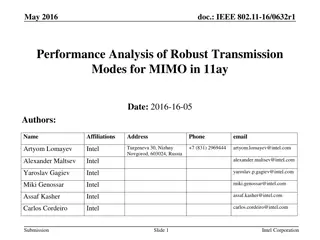Considerations on PHY for 60 GHz in IEEE 802.11-22/1865r0 Document
The document discusses the possibility of standardizing multi-link (ML) with bands in the sub-7 GHz range combined with bands in the 45-72 GHz range, proposing reusing a sub-7 GHz PHY for mmWave bands. It explores the impact of phase noise on choosing the OFDM numerology for operation in the 45-72 G
1 views • 13 slides
Enhancing Energy Efficiency in IEEE 802.11 HEW Standard
The document discusses the focus on improving energy efficiency in the IEEE 802.11 HEW standard to enhance the performance of wireless networks, aiming to complement LTE-based mobile networks. It emphasizes real-world spectrum efficiency enhancements and throughput improvements, particularly in indo
2 views • 7 slides
LDACS: Advancing Aviation Communication Technology
LDACS, a broadband and secure terrestrial communications system for aviation, is a mature technology designed for enhanced efficiency, safety, and capacity in air transportation. Developed under EUROCONTROL and refined within SESAR, LDACS offers state-of-the-art features like OFDM modulation and hig
0 views • 14 slides
Improving Padding Efficiency in HE SU PPDU with BCC
IEEE 802.11-16/0080r2 proposes a method to enhance padding efficiency in High Efficiency Spatially Multiplexed (HE SU) PPDU with Block Concatenation Coding (BCC) in 20MHz transmission. By adjusting the duration of the last OFDM symbol based on the excess information bits, this method aims to reduce
0 views • 17 slides
Wireless Broadband Technologies Overview
Delve into the world of wireless broadband technologies with a focus on Mobile WiMAX based on IEEE 802.16e. Explore concepts like OFDM and OFDMA, subchannelization schemes, OBBP vs. MOBBP, simulation results, and more. Discover the implementation of the Orientation-Based Burst Packing algorithm and
0 views • 66 slides
Simulation Results for LC-Optimized PHY Proposal in July 2019
The document presents simulation results for an LC-optimized PHY proposal for TGbb based on G.9991 PHY. It includes details on the simulation setup, frame detection results, header modulation, coding simulation results, payload modulation, and coding simulation results. The setup involved various re
0 views • 18 slides
Advanced Topics in Communication Systems: Lecture 18 Overview and Final Exam Details
In this lecture, we covered topics such as Spread Spectrum Modulation, Direct Sequence Spread Spectrum (DSSS), Interference Rejection, RAKE Receiver, and Multiuser Systems. The review of the previous lecture focused on OFDM design issues, including timing and frequency offset, peak-to-average power
0 views • 11 slides
Solution to I/Q Imbalance in OFDM Systems
OFDM modulation, widely used in communication systems like IEEE 802.11, suffers from I/Q Imbalance (IQI), impacting performance. This document proposes a robust solution called I-Q Decoupled OFDM (DC-OFDM), where independent data sets generate real (I) and imaginary (Q) signals, mitigating IQI effec
0 views • 24 slides
Suitability of IEEE 802.11ah for LPWAN Applications Analysis
This document analyzes the suitability of IEEE 802.11ah for Low Power Wide Area Network (LPWAN) applications. It examines the features of IEEE 802.11ah, such as OFDM-based FEC and its performance in fulfilling LP-WAN use-cases. The document also discusses channel models, interference resistance, and
0 views • 22 slides
Basic Transmission Characteristics of SUN-FSK and SUN-OFDM for Future Extensions
Introducing the basic transmission characteristics of IEEE 802.15.4 SUN-FSK and SUN-OFDM, deployed in various applications with improved reception schemes. The document outlines the need for future extensions in order to meet evolving usage models, applications, and bandwidth requirements, moving be
0 views • 19 slides
Non-Uniform Constellations for Higher Order QAMs in January 2015
Non-uniform constellations (NUCs) offer improved performance compared to uniform constellations (UCs) in the context of higher order QAMs discussed as potential technology for next-generation 60GHz OFDM. The use of NUCs optimizes the location of constellation points, ensuring robust and weak bits ca
0 views • 10 slides
Performance Analysis of Robust Transmission Modes for MIMO in 11ay
This presentation by Intel Corporation discusses the performance analysis of robust transmission modes for MIMO using MRC 1x2, Alamouti 2x1, and Alamouti 2x2 schemes in IEEE 802.11-16/0632r1. It evaluates the performance of OFDM and SC signal structures in frequency flat and frequency selective Rayl
0 views • 17 slides
Multi Division in Networking: Access Methods & Duplexing Techniques
Reviewing the concepts of multi-division in networking, this content delves into the need for multiple control channels, challenges in sharing channels, techniques like ALOHA and CSMA, and the importance of control channels and data channels. It explores access methods for control and data channels,
0 views • 20 slides
